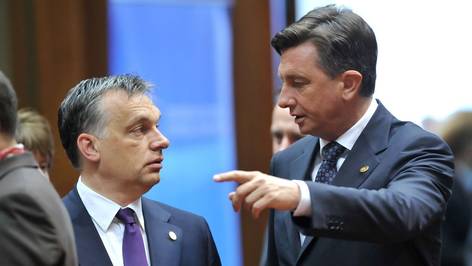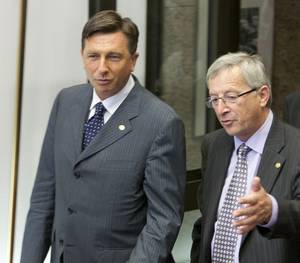NEWS
Prime Minister Pahor attends European Council Meeting in Brussels
The prime minister of the Republic of Slovenia, Borut Pahor, attended a two-day European Council meeting in Brussels, where the heads of state or governments of the EU's member states discussed economic governance and migration, and also adopted two conclusions regarding the imminent completion of Croatia's accession negotiations. The Council of the European Union appointed Mr Mario Draghi president of the European Central Bank from 1 November 2011. Mr Draghi hails from Italy.
The discussions of the two-day meeting were focused on economic issues, especially the long-term stability of our common currency: the euro. At the press conference held following the EU Council meeting, Prime Minister Pahor explained that 'the conclusions regarding Greece were rapidly adopted due to an implicit decision to wait for the Greek parliament before approving further aid and no one wanted to raise concerns as to what would happen if the required measures were not adopted'. Prime Minister Pahor is of the opinion that such an approach is politically expedient. He also said that discussions held with some state leaders have led him to believe that if Greece fails to implement the necessary reforms, previously unexpected events may occur. On the subject of Slovenia's ability to implement reform, Prime Minister Pahor again reiterated his decision to put forward a proposal for a discussion on potential compromise amendments to pension legislation, to be held concurrently with the preparation of the health care and labour market reforms; the proposal will be tabled to the social partners at the meeting scheduled for the beginning of July.
(Photo: Thierry Monasse/SPA)
At Thursday's meeting, the heads of state or governments of the EU member states concluded the European semester, i.e. a cycle of budgetary, macroeconomic policy and structural reform coordination between the member states. Prime Minister Pahor explained that the conditions in individual member states were reviewed and that four-fifths of indicators demonstrated that Slovenia was on the safe side; its major issues of concern are relatively weak growth and a pension system ill-equipped to respond to demographic changes. 'The latter is not only a long-term, but also a short-term fiscal issue,' maintained Prime Minister Pahor. He further explained that, despite the pension reform's failure to pass the referendum, the EU shows strong confidence that Slovenia will make every effort to remain in the euro area's core group. He brought his European counterparts up to speed on the unfavourable referendum result and on the Government's priority task to prepare a supplementary budget. It is the Government's intention not only to preserve but to strengthen fiscal stability through the supplementary budget, and talks on backing the motion will be held with deputies from all deputy groups and, separately, with the presidents of the parliamentary parties. Prime Minister Pahor also expressed his opinion that the statements made by the president of the Eurogroup, Luxembourg's prime minister, Jean-Claude Juncker, demonstrate the strong confidence held by the heads of state that Slovenia will do everything in its power to remain in the core group of the euro area.
Prime Minister Pahor added that today's European Council meeting had in fact adopted a decision on Croatia becoming the twenty-eighth EU member state in 2013. 'This is not just an important decision; this is an extremely important decision — for Croatia, for the region and for the EU,' stressed Prime Minister Pahor and added that half a year ago most heads of state or governments of the EU member states would not have dared to predict such an outcome and pointed out that most of the credit belonged to Croatia, which was able to maintain the pace of reform. He took the opportunity to sincerely congratulate the Croatian government, especially Prime Minister Kosor. Pending the accession, the EU will monitor those criteria which Croatia have not yet fully complied with. Prime Minister Pahor also said that 'in essence, Slovenia resolved all outstanding issues' in the negotiations carried out with Croatia, and added that, 'if a final solution was not reached, a suitable method to address such issues was identified'.





